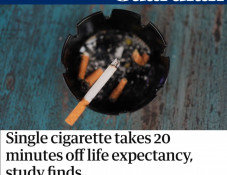
A bad night's sleep is as big a risk to your health as smoking
A bad night's sleep can be as big a risk to your health as smoking - and increase the chances of a stroke or heart attack, experts have warned, the Daily Mail reports.
Research shows that people with sleep disorders who get less than seven hours a night are four times more likely to suffer a stroke than those who regularly get a good night's shut-eye.
And those that tossed and turned were more than twice as likely to have a heart attack as those who slept soundly.
The study, by the World Health Organisation, suggests that a sleep disorder might be as bad for triggering a heart attack or stroke as smoking or failing to exercise.
Professor Valery Gafarov said: 'Sleep is not a trivial issue. Sleeping disorders were associated with greatly increased incidences of both heart attack and stroke.
'Poor sleep should be considered a modifiable risk factor for cardiovascular disease along with smoking, lack of exercise and poor diet.
For most people, good quality sleep is seven to eight hours of rest each night and people who are not sleeping well should speak to their doctor.'
Part of the WHO's MONICA programme looking into the causes of cardiovascular disease, the study involved 657 men aged 25 to 64 with no history of heart attack, stroke or diabetes in Novosibirsk, Russia.
Sleep quality was assessed when the study began in 1994 using the Jenkins Sleep Scale and patients with a rating of very bad, bad or poor were considered to have a sleeping disorder.
They were then assessed for occurrences of heart attacks and strokes over the next 14 years.
Nearly two-thirds (63 per cent) of participants who had a heart attack also had a sleeping disorder.
Men with a sleeping disorder had a risk of a heart attack that was 2 to 2.6 times higher and a stroke risk that was 1.5 to 4 times higher than those without a sleeping disorder between just 5 and 14 years of follow up.
Sleeping disorders are closely associated with anxiety, depression, hostility, vital exhaustion and are a manifestation of social stress in the population.
Newsfeed
Videos






























